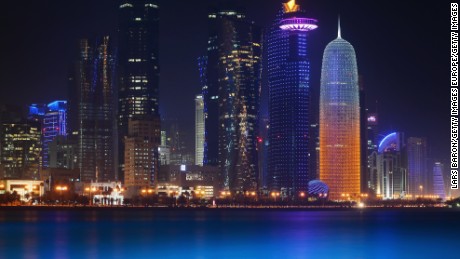Washington (CNN) A feud among Washington's closest Gulf allies could disrupt US efforts to fight ISIS and counter Iran in the Middle East over the long term, even as Trump administration officials insist the rift will have no immediate impact. Just two weeks after President Donald Trump celebrated the unity of Gulf nations in efforts to contain Iran and defeat ISIS, Saudi Arabia, the United Arab Emirates and Bahrain have led a dramatic move to cut off diplomatic relations with Qatar, host to the largest US military base in the Middle East.
The triad of Gulf nations, joined by Egypt, Yemen and Maldives, have halted flights to Qatar, closed their borders, and ordered Qatari citizens and diplomats out of their countries in the latest flare-up of long-simmering tensions, driven partly by the belief that Qatar is aligned too closely with Iran.
Countries in the Gulf are key to the US-led coalition against ISIS, with Qatar hosting the US military's Al Udeid Air Base, the main regional center for daily air missions and coordination of all air operations. But US officials, including Defense Secretary James Mattis, say the diplomatic rift will not disrupt that campaign.
"This dramatic situation"
"I am positive there will be no implications coming out of this dramatic situation at all," Mattis said, speaking Monday in Australia. "And I say that based on the commitment that each of these nations ... have made to this fight."
But there could be complications if the three countries refuse to work with Qatar -- all of which are part of the Gulf Cooperation Council -- on the anti-ISIS fight. Analysts also warn that the divide could undermine the administration's longer-term goal of challenging Iran's destabilizing activities across the region.
"It doesn't really change the strategic situation for the United States in the short run," said Hussein Ibish, a senior resident fellow at the Arab Gulf States Institute. "But in the long run, it could create openings for Iran."
Bruce Riedel, a former CIA officer and Middle East adviser to four administrations, says the situation highlights a major weakness among US allies in the Middle East when it comes to confronting Iran.
"It puts to rest the whole notion that the Gulf is somehow united behind a consensus on confronting Iran -- it's just not true," Riedel said. "The Gulf is not united, and the Muslim world is not united."
Pointing to the sectarian element to the divide between the Sunni Gulf nations and Shiite Iran, Riedel noted that "there are a lot of Muslims who think this whole jihad against Shiias is a mistake."
While Iran leads "a very disciplined and solid coalition which it controls with a great deal of authority, on the other side, there's this very disparate group of opponents who in many cases don't have diplomatic relations with each other," Ibish said. He pointed to Gulf Arabs and Israelis, who have no formal relations, or relationships that are riven with tension, like the strained ties between Turkey and both the Arabs and Israel.
This rift with Qatar "just emphasizes the lack of unity," Ibish said. "It potentially creates openings for the pro-Iranian camp, at least in terms of public opinion within the Arab world Arab nationalists will side with Qatar, Islamists will side with Qatar, some liberals will side with Qatar, too."
Viewed for "what it is"
Saudi Arabia and its allies made their move against Qatar after getting strong backing from Trump at a May 20-21 summit in Riyadh that left them feeling emboldened. The US president announced a $110 billion arms deal with the Saudis, and sent a message that nations there must take greater responsibility to rein in bad actors.
For now, one US military official told CNN the campaign against Qatar is being viewed "for what it is," describing it as "an anti-Iran move."
But it does leave the US potentially caught in the middle.
US military operations in Qatar include the Combined Air Operations Center, which coordinates anti-ISIS air operations, and the Pentagon's Al Udeid Air Base, which is used to launch air missions and stage supplies as well as house the forward headquarters of US Central Command.
Trump and his officials have praised Qatar, a tiny country of 300,000 people, for its strategic contributions. Mattis and Secretary of State Rex Tillerson met with their Qatari counterparts in April and May -- and at the May summit in Saudi Arabia, Trump said US relations with Qatar are "extremely good."
A State Department spokesperson reaffirmed the US commitment to Qatar Monday, saying that the US "relationship with Qatar is strong ... all of our partnerships in the Gulf are incredibly important and we count on the parties to find a way to resolve their differences sooner rather than later."
There appears to be no short-term fallout for the anti-ISIS coalition, the officials said, because so far there's been no demand from Saudi Arabia, the UAE and Bahrain that Qatar be booted from the group.
Tillerson, traveling with Mattis for meetings with Australian officials, said he didn't "expect that this will have any significant impact, if any impact at all, on the unified fight against terrorism in the region or globally." But he added that "we certainly would encourage the parties to sit down together and address these differences" and called for Gulf countries to "remain unified."
But that plea ignores history.
Saudis have long chafed at Qatar's independence on foreign policy, sometimes referring to their neighbor as "the village that got out of hand."
Qatar has close relations with Iran because they share the largest underwater natural gas field in the world. But recent Gulf reports have charged the relationship goes beyond resource management, accusing Qatari officials of meeting with the head of Iran's Revolutionary Guard Corps.
Qatar also supports the Muslim Brotherhood, has ties to Hamas, and hosts the media outlet Al Jazeera, which has reported stories the Saudi leadership dislikes.
In the 1990s, Gulf leaders had toyed with intervening in Qatar after the former emir had overthrown his father, which they saw as a terrible precedent for power transitions among the Gulf's royal families. In 2014, Saudi Arabia, the UAE, and Bahrain pulled their ambassadors from Qatar after it was too independent on GCC foreign policy issues.
In the last few weeks, the Gulf countries have been infuriated by a news report quoting the Qatari emir as saying there's "no reason" for their hostility to Iran. Qatar later claimed the news site had been hacked.
"The Saudis want all the Gulf countries to do what they tell them to do and the Qataris have, for a quarter of a century, gone out of their way to be their own master and sing to a different tune," Riedel said. Saudi Arabia wants to see Qatar "cut down to size," Riedel said. That means an end to Qatari relations with Iran, the expulsion of expels Hamas and the Muslim Brotherhood and "that Al Jazeera broadcasts politically acceptable news," Riedel said. "No more scoops about how badly the Saudi economy is doing."
In a sign that this latest spat may not blow over easily, Saudi Arabia has recently tried to undermine the Qatari emir's claim that he's a descendant of the founder of Wahhabi branch of Islam. "It's one thing to have disputes between countries in the Persian Gulf," Riedel said. "It's another thing to bring out the religious establishment and basically write them out of Islam."



No comments:
Post a Comment